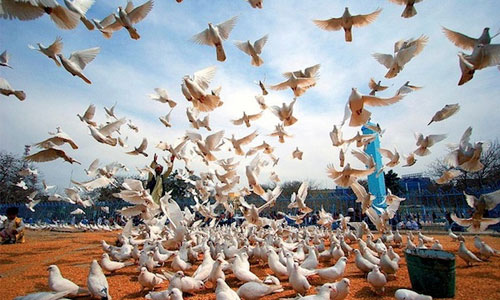On late August, a 12-member Chinese high-level delegation met the newly appointed Afghan National Security Adviser Hamdullah Mohib and Deputy Foreign Minister for Political Affairs Hekmat Khalil Karzai in Afghan capital city of Kabul to discuss security issues and bilateral cooperation on counterterrorism. The two sides had reiterated mutual cooperation on combating terrorism – mainly in the two neighboring areas of Afghan province of Badakhshan and China’s Xinjiang Uyghur Autonomous region – and exchanged views on establishing a better mechanism for counterinsurgency, deepening economic relations and holding the second round China-Afghanistan-Pakistan foreign ministers’ dialogue in the near future.
The Chinese side asked for signing a security agreement between Kabul and Beijing in a bid to enhance cooperation in war on terror and offered to pave the ground for professional training of the Afghan security forces.
On the other hand, a Pakistani delegation led by Foreign Minister Shah Mehmood Qureshi met Afghan President Muhammad Ashraf Ghani on Saturday to discuss peace and stability. The two sides discussed security, regional peace and stability, joint fight against terrorism and issues related to Afghanistan-Pakistan Action Plan for Peace and Solidarity (APAPPS). Ghani stressed complete implementation of the new bilateral ties framework the APAPPS.
Earlier, Pakistani Prime Minister Imran Khan said Afghans had suffered severely in compare with other countries’ people and are in dire need of security.
Considering the above facts, there are two good pieces of news for Afghanistan. For one, China is highly determined to support Afghanistan’s peace process and bring Kabul and Islamabad together. As a result of China’s efforts, the mistrust between the two sides has been minimized. Second, with Imran Khan’s leadership, the ties between Afghanistan and Pakistan have been cemented and both sides seek to join efforts in combating terrorism.
China has made concerted efforts to support peace and stability in Afghanistan adhering to the Afghan-owned peace process. Releasing Position Paper of the People’s Republic of China for the 73rd Session of the United Nations General Assembly, China has said, “China always supports the Afghan-led and Afghan-owned reconciliation process. We believe that broad and inclusive political reconciliation is the only solution to the Afghan issue and call on the Taliban to join the reconciliation process at an early date.” It further calls the international community to “create a sound external environment for the early resumption of peace talks between the Afghan government and the Taliban.”
Putting its weight behind Afghanistan’s peace process, China’s role is highly significant for two main reasons: First, China is a close neighbor of Afghanistan and Pakistan and could minimize the mistrust and misunderstanding between the two sides.
Second, Afghan officials and the grassroots as well as the Taliban exercise an optimistic view toward China since it played no destructive role in Afghanistan. That is to say, China has constantly respected the territorial integrity of Afghanistan and pursued the policy of mutual cooperation and win-win result. Likewise, China played no aggressive role against the Taliban and sat on the fence during their regime. Therefore, besides Afghanistan, the Taliban also seem less likely to resist China’s offer for talks.
Since China and Afghanistan share borders, China has a stake in peace issues. China fears that the insecurity crisis will spill over into Chinese Xinjiang autonomous region. Thus, China’s worries will be allayed with a stable and peaceful Afghanistan.
To view Kabul government, it has been constantly offering olive branch to the Taliban and urged them to stop spilling the blood of Afghan people, mainly women and children. Nonetheless, the Taliban’s incumbent leader Mullah Haibatullah Akhundzada has turned the peace offer down and intensified attacks against the government. Since Kabul has no leverage on the Taliban, it urged the neighboring countries in general and China and Pakistan in particular to support Afghanistan in brokering peace talks through bringing the Taliban to the table. The process is yet to come to fruition.
Meanwhile, Afghan soldiers have been fighting at the frontline against terrorism and paid huge sacrifice in this regard. The two last years have been the deadliest years for Afghanistan as both soldiers and civilians sustained heavy casualties in the wake of the indiscriminate attacks carried out by terrorist groups. Since NATO forces could not bring peace in the country after more than a decade of their military mission, it will be hard for Kabul government to defeat terrorist groups on its own.
With this in mind, stakeholders, especially China and Pakistan, believe that negotiation and non-violent mechanism will be the only solution to the insecurity. Now Afghan officials hope that Afghanistan’s two neighboring countries China and Pakistan will nudge the Taliban to come to the table and reach agreement with Kabul government.
It is self-explanatory that China is a heavyweight stakeholder and has played a highly constructive role so far, however, there is still a lot be done. Notwithstanding all efforts made to stabilize the country, Afghan nation suffers severely as a result of escalated insurgency. That is, the Taliban’s indiscriminate attacks against Afghan people show their lukewarm response and mala fide intention to peace talks.
Since terrorism has changed into a global threat, it is hoped that Afghanistan’s neighboring countries and international community will support Afghanistan in combating terrorism. If the Taliban show no conciliatory remark despite all the concerted efforts made by Kabul and Beijing, the world should support Afghanistan in its military deal against terrorists. In short, Afghanistan receives all stakeholders, including China and Pakistan, with open arms to partner it in counterterrorism and peace process.
Home » Opinion » A Trilateral Effort to Bring Peace in Afghanistan
A Trilateral Effort to Bring Peace in Afghanistan
| Hujjatullah Zia

